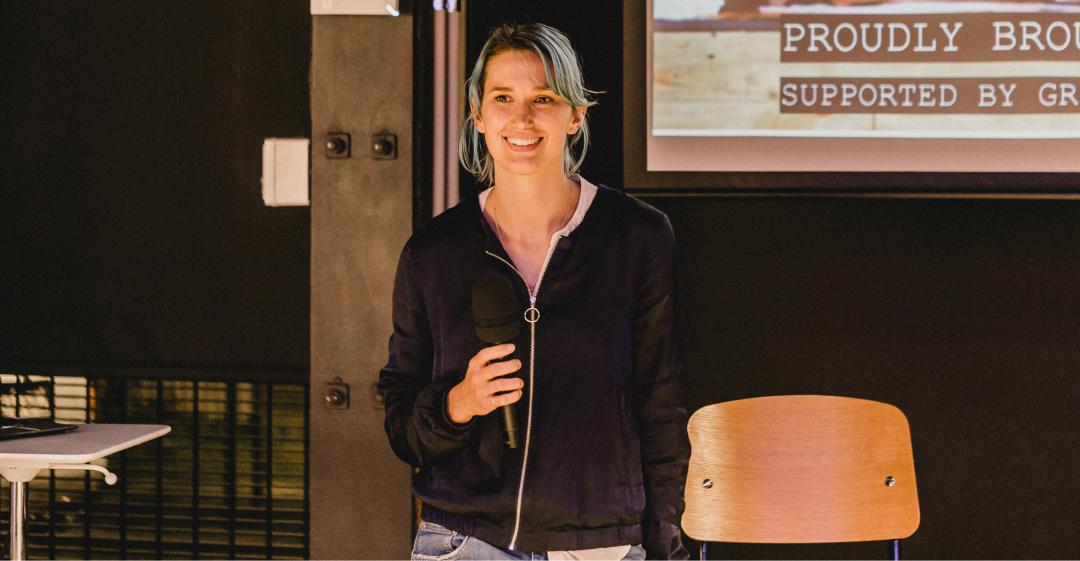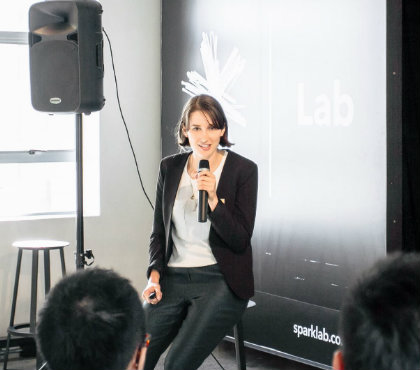“The corporate environment was stifling.”

What work were you doing previously?
I worked in corporate banking.
I started in the Finance team, then moved to Treasury and finally Institutional Banking before quitting to start my own business.
What are you doing now?
Now I'm the founder of a company called Mum's Garage.
We teach people how to execute on ideas and develop businesses that enable meaningful work and a positive impact. Our product is an online learning and community platform.
I spend most of my time working with budding entrepreneurs to help them start and grow companies.
Why did you change?
I always had my own ideas and aspirations to start a business; I just didn't know how to get started.
So, I finished a business degree and fell into corporate banking.
Although I worked with some great people, banking wasn't for me. The corporate environment was stifling and I didn't find the work fulfilling. I had many ideas that I wanted to make happen.
So, after four years I quit to focus on starting my own business.
When was the moment you decided to make the change?
I had the opportunity to attend a week-long leadership camp, which the company I was working for at the time kindly sent me along to.
During that time I was immersed in an environment of interesting, entrepreneurial people. It was one of the first times I'd experienced an environment and community like that.
It snapped me out of my current world and I realised that I couldn't keep going on the path I was heading down.
Are you happy with the change?
Yes.
A hundred times, yes.
What do you miss and what don't you miss?
At times, I miss not having a stable income.
Starting a business can be hard and stressful, especially when you're responsible for paying other people. So, I have appreciation for the peace of mind that a 9–5 job provides.
But at the same time, that's what I love about running your own business. The value that you receive is driven by the decisions you make, by what you create with the resources you have.
What I don't miss is having to conform to a culture I don't align with, and doing work that utilises a very small portion of my capabilities.
How did you go about making the shift?
I saved enough money to last six months without needing to find another source of income.
While I was working I also invested in programmes and learning opportunities to help prepare myself for starting a business.
I found people who could hold me accountable to taking action on my ideas and who were also working on starting their own businesses.
I handed in my notice which meant I had to figure out what I was doing within six weeks before my job ended.
This forced a lot of things into action.
What didn't go well? What wrong turns did you take?
I have taken a lot of wrong turns, but fortunately I haven't yet taken any that I haven't been able to correct.
I'm a 'yes' person, so I've said yes to far too many things for far too long, which has meant that the business hasn't grown as fast as I'd intended. But at the same time, I have learnt far more than I could have imagined along the way, which adds to the value of what we do.
And I haven't focused enough on making or acquiring money, so growing has taken longer than expected. But at the same time, I'm happy with where we are right now, and the trajectory we're on, so maybe we're on a better pathway because of it.
How did you handle your finances to make your shift possible?
As I mentioned earlier, I saved enough money to last six months (on a very strict budget).
This meant I didn't have to get another job, and I was able to invest in opportunities to develop myself and learn more about starting a business.
I've also taken on some part-time work along the way, as needed.
What was the most difficult thing about changing?
Making the decision to do it.
It took me a long time to get to that point. If I think back on it, I knew very early on that banking wasn't for me, I just didn't know how to go about making the change. So, I took the easier path of changing roles within the bank, hoping that I would find the job that satisfied me.
But I was looking in the wrong place.
What help did you get? 
Before I quit I joined another programme to learn about starting a business.
The best thing about that was connecting with like-minded people. That made a big difference. It was also the first time I'd invested a decent amount of money in myself, which committed me to the journey.
I also had a mindset coach for a period, which was a big help in the early stages. Mindset is a very important part of starting your own business.
What have you learnt in the process?
I think the most interesting things I've learnt all stem back to human behaviour and what drives us.
We're highly adaptive and most of our decisions are driven by an innate survival instinct. Many people are brought up in an environment that promotes a 9–5 job as the pathway to success, and that's if they're lucky.
To risk losing that by doing something dramatically different is a scary thing. So, people continue to exist as they are, in jobs, relationships, and situations that make them unhappy.
I've learnt that personal development and, in many cases, success come from being able to take action despite the fear. This is what successful entrepreneurs become good at.
Initially it's about just taking a very small step – maybe going along to an event that interests you, even if you don't know anyone else going. The next step might be talking to people about your ideas or passions. Then it might be talking to the people who could be your customers.
These small steps when compounded can make a dramatic difference to how a person lives their life and what they're able to accomplish.
What would you advise others to do in the same situation?
Get help.
There will be many people who have been in a similar position to you, or organisations that have built products to solve the problems that you're facing.
Use them, and don't be afraid of investing in yourself. You are your own greatest asset, so give yourself the time and resources you need to be able to take the next step towards where you want to get to.
What resources would you recommend to others?
As a general resource, I recommend Quora for finding answers to some of your problems, and YouTube for the same reason.
When I started out, I watched a lot of Alan Watts YouTube videos, which I highly recommend if you're trying to figure yourself out.
To find out more about Natalie's business, visit www.mumsgarage.com.
What lessons could you take from Natalie's story to use in your own career change? Let us know in the comments below.



